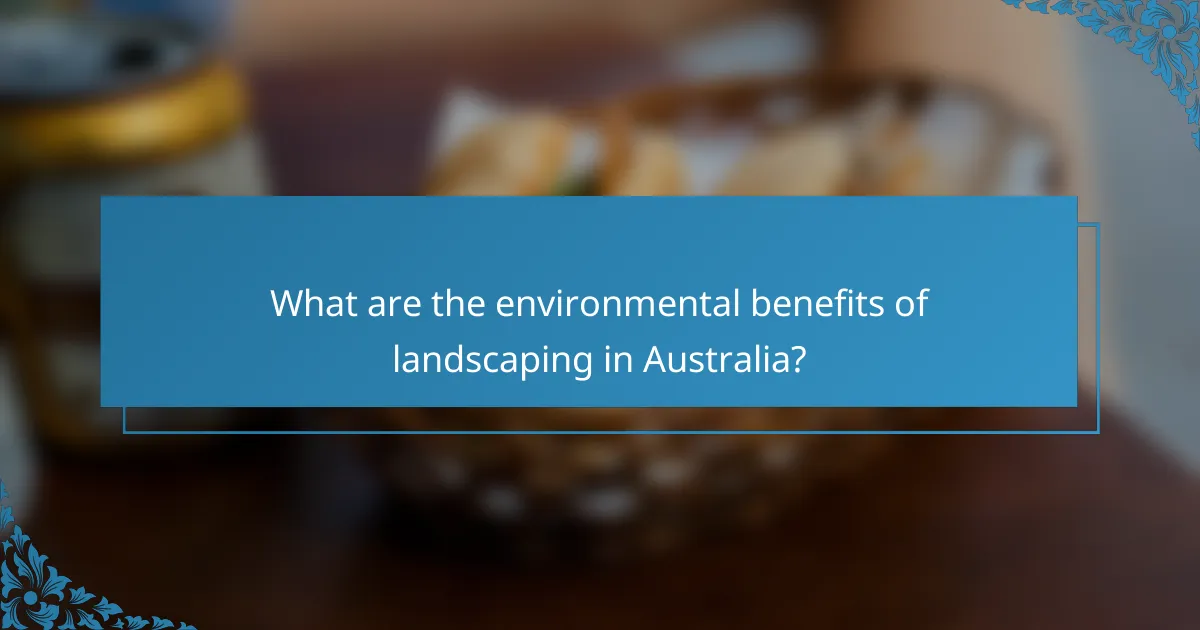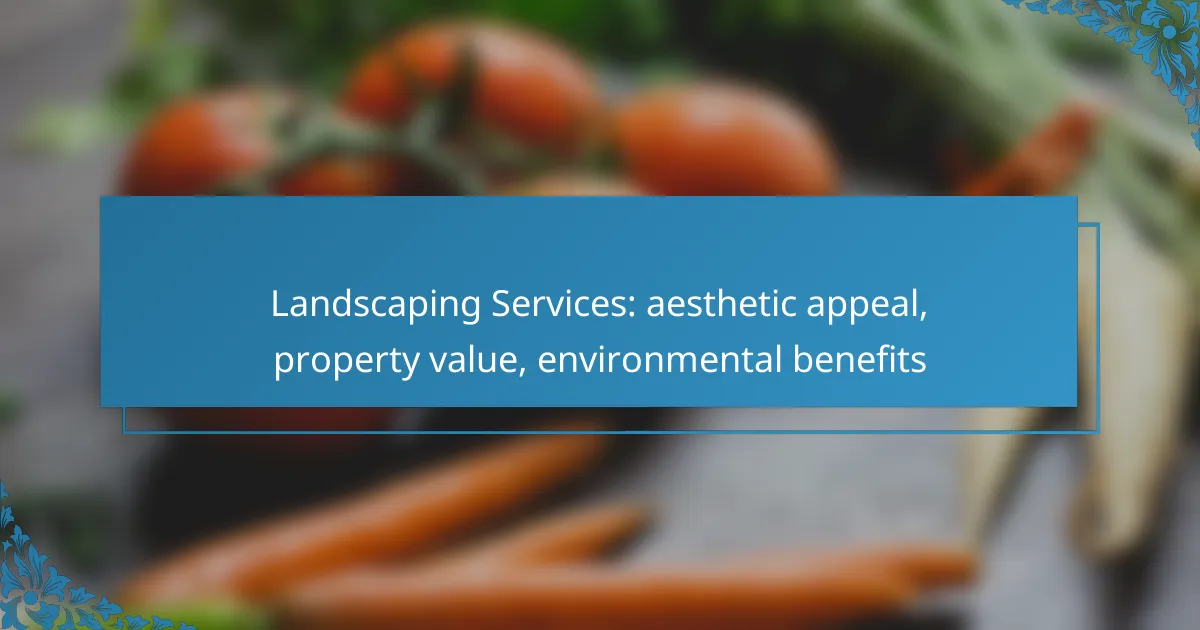Landscaping services play a crucial role in enhancing the aesthetic appeal and overall value of properties, making them more attractive to potential buyers. In addition to beautifying outdoor spaces, these services offer significant environmental benefits, such as improved air quality and water conservation, contributing to a healthier ecosystem. Investing in professional landscaping can transform any property into a welcoming and sustainable environment.

How can landscaping services enhance property value in Sydney?
Landscaping services can significantly boost property value in Sydney by improving aesthetic appeal and creating a welcoming environment. Well-designed outdoor spaces not only attract potential buyers but also contribute to higher property assessments.
Increased curb appeal
Increased curb appeal is one of the most immediate benefits of professional landscaping. A well-maintained garden, attractive pathways, and vibrant plants create a positive first impression, making the property stand out in the neighborhood.
Simple enhancements like fresh mulch, trimmed hedges, and colorful flowers can elevate the overall look of a home. Investing in landscaping can yield a return of several percentage points in property value, particularly in competitive markets like Sydney.
Higher resale prices
Homes with professionally landscaped yards often command higher resale prices compared to those without. Studies suggest that well-executed landscaping can add tens of thousands of Australian dollars to a property’s value.
For instance, properties with mature trees and well-designed outdoor living spaces may sell for a premium. Buyers are willing to pay more for homes that require less immediate work, making landscaping a wise investment.
Attractiveness to buyers
Attractiveness to buyers is crucial in a competitive real estate market. Landscaping can create an inviting atmosphere that appeals to a wide range of potential buyers, from families to retirees.
Features like outdoor seating areas, gardens, and water features can enhance the overall appeal of a property. Additionally, sustainable landscaping practices, such as native plant gardens, can attract environmentally conscious buyers, further increasing interest and value.

What are the environmental benefits of landscaping in Australia?
Landscaping in Australia provides significant environmental benefits, including improved air quality, enhanced biodiversity, and water conservation. These advantages contribute to a healthier ecosystem and promote sustainable living practices.
Improved air quality
Landscaping plays a crucial role in improving air quality by filtering pollutants and producing oxygen. Trees and plants absorb carbon dioxide and release oxygen, which is vital for maintaining a balanced atmosphere.
In urban areas, well-planned landscaping can reduce the concentration of harmful substances like nitrogen dioxide and particulate matter. Incorporating a variety of native plants can maximize these benefits, as they are well-adapted to local conditions and require less maintenance.
Enhanced biodiversity
Effective landscaping supports enhanced biodiversity by creating habitats for various species. Native plants attract local wildlife, including birds, insects, and small mammals, promoting a balanced ecosystem.
To foster biodiversity, consider planting a mix of species that bloom at different times throughout the year. This not only provides food sources for pollinators but also encourages a diverse range of fauna to thrive in your garden.
Water conservation
Landscaping can significantly contribute to water conservation through the use of drought-resistant plants and efficient irrigation systems. By selecting native species that require less water, homeowners can reduce their overall water usage.
Implementing techniques such as rain gardens and permeable paving can help manage stormwater runoff and promote groundwater recharge. These practices not only conserve water but also reduce the risk of erosion and flooding in local areas.

What types of landscaping services are available in Melbourne?
In Melbourne, a variety of landscaping services cater to enhancing outdoor spaces, improving aesthetic appeal, property value, and environmental benefits. Key services include garden design and installation, lawn care and maintenance, and hardscaping services, each offering unique advantages for homeowners and businesses.
Garden design and installation
Garden design and installation involves creating visually appealing outdoor spaces tailored to the client’s preferences and the local climate. Professionals assess factors such as soil quality, sunlight, and water availability to select suitable plants and layout designs.
When planning a garden, consider incorporating native plants that thrive in Melbourne’s environment, as they require less water and maintenance. Collaborating with a designer can help you achieve a cohesive look while maximizing the space’s functionality.
Lawn care and maintenance
Lawn care and maintenance services focus on keeping grass healthy and vibrant throughout the year. This includes regular mowing, fertilization, weed control, and pest management, ensuring a lush lawn that enhances property value.
In Melbourne, seasonal changes can affect lawn care practices. For instance, during the warmer months, more frequent watering and mowing may be necessary, while winter may require less maintenance. Hiring professionals can save time and ensure your lawn remains in optimal condition.
Hardscaping services
Hardscaping services involve the installation of non-plant elements in landscaping, such as patios, walkways, retaining walls, and fences. These features add structure and functionality to outdoor spaces while complementing the overall design.
When considering hardscaping, choose materials that are durable and suitable for Melbourne’s climate, such as natural stone or concrete. Proper installation is crucial to prevent issues like erosion or drainage problems, so hiring experienced professionals is advisable.

How to choose the right landscaping service provider?
Selecting the right landscaping service provider involves assessing their reputation, service offerings, and pricing. Focus on finding a company that aligns with your specific landscaping needs and budget.
Check local reviews
Pay attention to both positive and negative feedback, as this can help you identify consistent strengths or weaknesses. Look for companies with a high number of reviews and an overall positive rating to ensure reliability.
Evaluate service offerings
Make a list of your landscaping needs and compare them with the services offered by each provider. This will help you determine if they can meet your expectations and deliver the results you desire.
Compare pricing structures

What permits are required for landscaping projects in Brisbane?
In Brisbane, landscaping projects may require various permits depending on the scope and nature of the work. It’s essential to understand which permits are necessary to ensure compliance with local regulations and avoid potential fines.
Building permits
Building permits are typically required for landscaping projects that involve significant structural changes, such as the installation of retaining walls or large garden structures. If your project includes alterations that affect drainage or land stability, you will likely need to apply for a building permit from the Brisbane City Council.
To obtain a building permit, you must submit detailed plans and specifications of your project. It’s advisable to consult with a professional to ensure your plans meet the necessary building codes and standards.
Environmental permits
Environmental permits may be necessary for landscaping projects that impact local ecosystems, such as tree removal or the alteration of natural waterways. In Brisbane, these permits are crucial for protecting native flora and fauna and maintaining biodiversity.
Before starting your project, check with the Queensland Government’s Department of Environment and Science to determine if your landscaping activities require an environmental permit. Engaging with an environmental consultant can also help navigate these requirements effectively.
Local council approvals
Local council approvals are essential for most landscaping projects in Brisbane, especially those that involve public land or significant changes to the landscape. You will need to submit your plans to the Brisbane City Council for review and approval.
Approval processes can vary in duration, so it’s wise to start early. Ensure that your project complies with local planning schemes, and consider reaching out to the council for guidance on the specific requirements for your landscaping project.

How does landscaping contribute to community well-being?
Landscaping significantly enhances community well-being by improving aesthetic appeal, increasing property values, and providing environmental benefits. Thoughtfully designed green spaces encourage healthier lifestyles and foster a sense of belonging among residents.
Promotes outdoor activity
Well-maintained landscapes create inviting environments that encourage outdoor activities such as walking, jogging, and playing. Parks and gardens with walking paths, benches, and recreational facilities motivate residents to engage in physical exercise, which is essential for maintaining good health.
Communities can enhance outdoor activity by incorporating features like playgrounds, sports fields, and picnic areas. These amenities not only promote fitness but also attract families and individuals, fostering a vibrant community atmosphere.
Enhances social interaction
Landscaping plays a crucial role in enhancing social interaction by providing communal spaces where residents can gather. Well-designed parks and gardens serve as venues for events, picnics, and casual meet-ups, helping to build relationships among neighbors.
To maximize social interaction, communities should consider creating multi-functional spaces that accommodate various activities. Features such as seating areas, community gardens, and open lawns can facilitate gatherings and encourage a sense of community cohesion.
